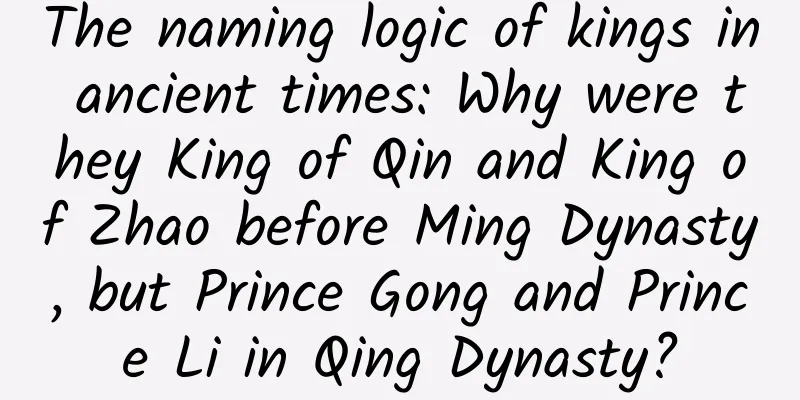The naming logic of kings in ancient times: Why were they King of Qin and King of Zhao before Ming Dynasty, but Prince Gong and Prince Li in Qing Dynasty?

|
This article is about 3800 words Reading time: 10 min In ancient China, the title of nobility reflected a person's political and social status, and the title of "king" was the highest title that the emperor could confer on others after the establishment of the imperial system by Qin Shihuang. It was a supreme honor. Before the Ming Dynasty, all kings were named after the country, such as King of Qin, King of Wei, etc. Emperor Taizong of Tang, Li Shimin, was once named King of Qin, his third brother Li Xuanba was named King of Wei (posthumously), his fourth brother Li Yuanji was named King of Qi, and his fifth brother Li Zhiyun was named King of Chu. Image of Qin Wang Li Shimin in film and television. Source: Screenshot of the TV series "The Long Song of Zhenguan" However, the Qing Dynasty named the kings with auspicious characters, such as Prince Gong, Prince Li, Prince Rui, etc. Why was that? Naming habits of kings before the Qing Dynasty The so-called feudal system is to establish states by enfeoffment, in which the common ruler or the central dynasty grants fiefs to members of the royal family, royal families and meritorious officials. The royal relatives who obtained the territories became princes, owning all the resources and income of the territories, and only needed to pay a certain amount of tribute to the royal family to fulfill their obligations. Generally speaking, China's feudal system began in the Western Zhou Dynasty, when the Zhou royal family divided the territory among the princes. "Zuo Zhuan" records that when Duke Zhou was in rebellion against Zhou, Guan Shu and Cai Shu joined forces with Wu Geng, a descendant of the Shang Dynasty, and believed that enfeoffment was inevitable, so he enfeoffed the relatives of the Zhou royal family as princes in various places, using this vassal relationship to protect the four directions for the Zhou Dynasty and serve as a barrier for the Zhou Dynasty. The Xia, Shang and Zhou dynasties all used tribes as their dynasty names, so the next-level political organizations, the vassal states, used the names of their territories as their country names, such as Jin, Qin, Qi, Chu, Zhao, Wei, Han, etc. The kings of the vassal states also followed suit and named themselves after their countries, such as Duke Huan of Qi, Duke Wen of Jin, Duke Mu of Qin, King Zhuang of Chu, Duke Xiang of Song, etc. Since then, among the kings of all dynasties in China, the four titles of "Jin, Qin, Qi and Chu" are the most honorable. Schematic diagram of the Western Zhou Dynasty. Source: People's Education Press "High School History" textbook After the Qin Dynasty unified China, Qin Shihuang implemented the county system throughout the country. Local governments were managed by bureaucrats sent by the central government. There was no need to establish vassal states, and naturally there was no problem of naming kings. However, Qin Shihuang acted too hastily, skipped the "experimental" link in the process of institutional change, ignored the path dependence of the feudal system, and needed a certain buffer period. He did not grasp the basic laws of the transformation or transition between the old and new systems, which became one of the reasons for the collapse of the entire empire. The Han Empire, established on the ruins of the Qin Dynasty, learned the lesson of the Qin Dynasty's rapid demise and did not blindly enforce the county system throughout the country. Instead, it adopted a system in which the feudal system and the county system coexisted. This was called by historian Lu Simian: "There was a reaction to the feudal system between the Qin and Han dynasties." The naming of the kings was still in accordance with the tradition of the Zhou Dynasty, named after the geographical scope. For example, the seven kings with different surnames were Han Xin, King of Chu, Peng Yue, King of Liang, Ying Bu, King of Huainan, Zang Tu, King of Yan, Zhang Ao, King of Zhao, Xin, and Wu Rui, King of Changsha. Among the kings with the same surname, Liu Bang's eldest son Liu Fei was granted the title of "King of Qi". Before Liu Heng became Emperor Wen of Han, he was granted the title of "King of Dai", which was no different from the Spring and Autumn Period. In the early Western Han Dynasty, the coexistence of the feudal system and the county system did meet the needs of a new regime to integrate multiple forces in order to stabilize the country. However, as the blood relationship weakened, the aristocratic politics represented by the feudal system would sooner or later challenge the king for the supreme power. As expected, the power of the kingdoms in the Han Dynasty expanded and developed, and during the reigns of Emperor Wen and Emperor Jing, a situation of being too big to be eliminated appeared, and eventually the Rebellion of the Seven Kingdoms occurred. In the early Han Dynasty, counties and kingdoms existed side by side. Source/Screenshot from the documentary "A General History of China" Although all subsequent Chinese dynasties realized that the county system with bureaucratic politics at its core was more conducive to stability, the feudal system has been trying to make a comeback. During the Western Jin Dynasty, the Sima clan was enfeoffed as princes, which led to the Eight Princes Rebellion and the subsequent collapse of the Western Jin Dynasty. During the Ming Dynasty, Zhu Yuanzhang enfeoffed his twenty or so sons as princes, which resulted in the rebellion of Yan Wang Zhu Di, who seized the throne from his nephew, Emperor Jianwen. Despite this, the central government's tendency to gradually centralize power is an inevitable trend. Successive emperors learned from the lessons of the early Han Dynasty and tried every means to limit the privileges and fiefdoms of the princes to avoid the division of the country and political chaos. For example, during the Tang Dynasty, the kings were only given titles, but no actual fiefdoms, so naturally they had no actual authority over the fiefdoms and could only get the corresponding fiefdom taxes. Before becoming emperor, Emperor Gaozong of Tang, Li Zhi, was given the title of King of Jin, but he had never been to Shanxi. However, the names of these kings were still taken from geographical concepts. Since the kings had no actual territories, some of the titles were simply named without considering geographical concepts and given auspicious names, such as Emperor Xuanzong of Tang, who was King Guang before he ascended the throne; Li Mao, the son of Emperor Xuanzong of Tang and Yang Guifei's ex-husband, was King Shou. The Song Dynasty basically followed the system of the Tang Dynasty, and the titles of the kings were all auspicious words. For example, the title of Song Huizong Zhao Ji before he ascended the throne was Prince Duan, and the title of Song Gaozong Zhao Gou before he ascended the throne was Prince Kang. After Zhu Yuanzhang established the Ming Dynasty, he thought it was better to establish states and grant titles to all his sons. Since the title of a king has actual territory, the title name is naturally taken from the geographical concept, such as Yan Wang Zhu Di. After Ming Chengzu Zhu Di, the Ming Dynasty began to try to reduce the power of the princes, and many titled kings only had titles but no real power. In this case, they should give their sons auspicious names, such as Ming Sizong Chongzhen, who was Xin Wang before he ascended the throne. Generally speaking, the dynasties before the establishment of the Qing Dynasty already had the habit of giving auspicious names to kings, but not all kings were like this. Many names of kings were taken from geographical concepts, especially the King of Jin, who was very popular. All the kings wanted to be called the King of Jin. According to records, excluding hereditary kings, there were 29 Kings of Jin in history, and 12 of them successfully became emperors. Portrait of Emperor Zhu Di of the Ming Dynasty. Source: The Palace Museum Some people believe that many titles that seem to be auspicious are actually named after geographical concepts, or a mixture of the two. For example, the sons of Emperor Shenzong of the Ming Dynasty, the King of Fu, the King of Hui, and the King of Rui, can be said to be named after the nouns of blessing, harmony, and auspiciousness, or they can be said to be named after the place names of Fuzhou, Huizhou, and Ruizhou. But according to tradition, if the title is taken from a geographical concept, it is basically the name of a larger administrative unit. How could a place name of a small place be used as the name of the title? This is neither grand nor domineering, and it should not be the source of the name that the kings are happy to choose. The titles that the kings dream of are titles like the King of Jin and the King of Qin. Why were the names of kings in the Qing Dynasty so special? The names of kings in the Qing Dynasty were not based on geographical concepts at all. On the one hand, it is the custom of the Manchus themselves. They are accustomed to adding euphemisms as prefixes before the monarch. For example, Nurhaci once proclaimed himself "Shule Beile" (Beile was the highest-ranking title in the Later Jin Dynasty), which means "wise king". This is completely opposite to the founders of the Han regime. For example, Zhu Yuanzhang proclaimed himself King of Wu before he became emperor. Wu is a geographical concept, not a euphemism. Nurhaci's eldest son, Chu Ying, was called "Guanglue Beile", which means "resourceful king" in Chinese. Nurhaci. Source/The Palace Museum The second emperor of the Qing Dynasty, Emperor Taizong of the Qing Dynasty, Aisin-Gioro Huang Taiji, conferred titles on the earliest batch of princes on April 23, the first year of Chongde. According to historical records: "In accordance with the decree of the Kuanwenrensheng Khan, the merits of the brothers, nephews and nephews were divided, and the great Beile was conferred the title of Heshuo Lixiong Prince, Jirgalang Beile was the Heshuo Zheng Prince, Molegendaiqing Beile was the Heshuo Rui Prince, Erkechughul Beile was the Heshuo Yu Prince, Haoge Beile was the Heshuo Su Prince, Yuetuo Beile was the Heshuo Cheng Prince..." The titles of these princes are also auspicious words, such as Prince Rui, Prince Yu, Prince Zheng, etc., which mean "clever prince", "brave prince" and "important prince" respectively. The six princes who were canonized were all Nurhaci's legitimate sons, and were also the leaders of the Eight Banners. For example, Daishan was Nurhaci's second legitimate son, and was canonized as the leader of the Plain Red Banner, and was canonized as Prince Heshuo Li; Dorgon was Nurhaci's fourteenth legitimate son, and was canonized as the leader of the Bordered White Banner, and was canonized as Prince Heshuo Rui; Jirgalang was the sixth legitimate son of Nurhaci's brother Shurhaci, and was canonized as the leader of the Bordered Blue Banner, and was canonized as Prince Heshuo Zheng. At the same time, the Manchus' titles of princes were not based on geographical concepts, but also on practical factors. At that time, they were still outside the Great Wall, and there was no Qin, Jin, or Wei territory for them to occupy. They could not give their princes titles such as Jiucaituozi Wang, Zhaojiawobao Wang, Hongjiataozi Wang, Grapegoucun Wang, Paotonggou Wang, etc. After the Qing army entered the Central Plains and established its capital, the names of the princes continued the Manchu tradition of using auspicious words. For example, the two princes who were canonized after entering the Central Plains were Prince Chengze Shuo Sai (later the successor was renamed Prince Zhuang) and Prince Shuncheng Leke Dehun. Chengze means a person with good fortune, and Shuncheng means a person with harmony. In short, they are all beautiful words. At this time, the Qing Dynasty also conferred titles on four Han princes, namely, Wu Sangui, the King of Pingxi, Shang Kexi, the King of Pingnan, Geng Jingzhong, the King of Jingnan, and Kong Youde, the King of Dingnan. The titles of these four people were not taken from auspicious words, but were inherited from the titles given to them by the Ming Dynasty. For example, Wu Sangui, the King of Pingxi, was originally conferred the title of Pingxi Bo by Emperor Chongzhen. The "West" he wanted to pacify was Li Zicheng, because Li Zicheng's rebel army came from the west. After Wu Sangui surrendered to the Qing Dynasty, the Qing Dynasty quickly pacified the world. In order to reward this surrendered general, the Qing Dynasty rewarded him greatly, from earl to prince. However, the prefix of his title has always been the word "Pingxi", which has never changed. Stills from the TV series Wu Sangui. Source/Screenshot from the TV series The Qing Dynasty did not change the titles of these four Han princes into auspicious names, perhaps because it wanted to distinguish the Han princes from the Manchu princes, or perhaps it was out of respect for their existing titles. Originally, the Later Jin regime established by Nurhaci would never allow princes to occupy actual fiefs. The Eight Banners system he created organized the Jurchens into a military organization, and engaged in production and war under the control of the Jurchen nobles. After the Qing Dynasty entered the Shanhai Pass, it gave four Han princes actual fiefs, who eventually became local kings and launched the Three Feudatories Rebellion. The Three Feudatories Rebellion taught the Qing government a lesson, that is, it is absolutely impossible to allow princes to have actual fiefs, no matter whether they are Han or Manchu, no matter whether they have made contributions to the court or are just legitimate sons. Once the princes have actual fiefs, they will control and influence local officials, control their own armies, and control local taxes, etc., becoming a hidden danger to the empire. "Portrait of Emperor Kangxi in Military Uniform", Source: Gong Shuduo and Liu Delin, eds., Illustrated History of China, Sichuan People's Publishing House, 2019, p. 54 Therefore, the best way was to "confer but not establish", and concentrate all the royal family members in the capital, and all their salaries, royal officials, and guards were brought under the unified management of the state, and were granted by the clan affairs office according to regulations. They were not allowed to leave the capital without the emperor's order to avoid having their own troops in the local area. At the same time, all military power was returned to the central government. In case of war, the princes would be temporarily sent to lead the troops, and sometimes the emperor would simply lead the army himself. After Yongzheng came to power, he was even more extreme, issuing a series of orders to sever the subordinate relationship between the bannermen and the banner owners, and took over the personnel power of the Eight Banners. These royal relatives had no actual fiefs, so they naturally continued the tradition of naming their titles before the Qing army entered the pass, using auspicious words. This policy really worked well, and the Qing Dynasty never had the phenomenon of one's own people rebelling against one's own people. Behind the origin of the name of a small prince is the political calculation of successive dynasties to consolidate their rule, which is worth our careful consideration. However, no matter how they calculated, they were bound to decline in the face of the general trend of history. References: 1. Du Jiaji, "Reasons for the Conferment of the "Iron Hat King" in the Qing Dynasty and Related Issues" 2. Lu Simian: History of Chinese Institutions 3. Qian Mu's "Political Gains and Losses in Chinese History" END Author: Bai Zhou Editor | Zhan Xihui Proofreading | Gu Yue *This article is an exclusive article of "National Humanities and History". Readers are welcome to forward it to their friends. |
>>: We will never forget these people in 2021!
Recommend
Seeing a doctor, taking medicine, and joining a church: three logics of content payment today
Luo Pang said that content payment is far from be...
Practice KOL marketing from 0 to 1!
KOL, the full name of which is Key Opinion Leader...
How did people open cans when there were no cans?
Why not just change the name of the can to the di...
What is keyword promotion? Share 4 promotion tips!
Keyword promotion means that when users search us...
Bleeding gums, is it caused by "heat"? The answer is...
Author: Zheng Shuguo, Chief Physician, Peking Uni...
Why Vitamin C effervescent tablets should not be taken for a long time
In daily life, many people take vitamin C efferve...
Can people with diabetes eat mooncakes? Be careful about "sugar-free mooncakes" and don't eat them casually
During the Mid-Autumn Festival, it is a Chinese c...
Lucheng SEO training: Several common black hat methods
In the SEO industry, the only thing that does not...
The head of Tesla's subsidiary disappeared after being given enough benefits
According to foreign media reports, Tesla said it...
Do you always feel that your cat is not right? Be careful...it may be mentally ill
Key Points ★ From a human psychology perspective,...
Bilibili Product Analysis
In the current industry context, Bilibili has bla...
What chemical materials are used in the epoch-making brain-computer interface?
On February 20, American entrepreneur Musk said t...
Can "useless" paid content activate Douban, which has been slow for twelve years?
Last Friday, the poet Bei Dao did a session on Do...
What else can happen besides rain?
What falls from the sky? Bugs? Birds? Is that a r...









